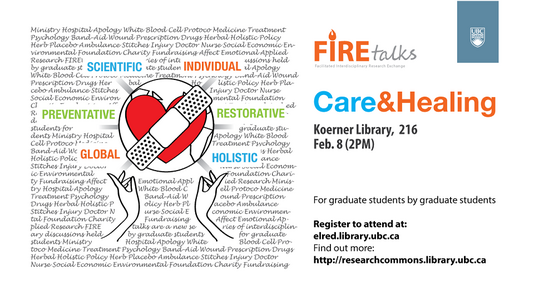Care and Healing
Can we only heal individuals or is possible to heal entire cultures? Are scientific and holistic approaches to care and healing necessarily mutually exclusive? Is preventive always better than restorative care? As graduate students, many of us are involved in care and healing, and we can think about these terms in many different ways. Present your ideas, research or opinions at the first FIRE Talk of 2013!
Date: February 8, 2 to 4 pm
Location: Koerner Library, Room 216
FREE Coffee, Tea and Snacks!
Join us for the discussion! (Register to attend here)!
Presentation Topics
Examining the Role of the Connection with the Land in Healing the Trauma of the Effects of the Indian Act
By: Alanna Quock
My thesis proposes that through the firm establishment of identity in a contemporary context the legacy of the Indian Act can be dismantled and the effects healed. It considers the connection with the land as paramount to reestablishing the foundation of collective identity. It seeks to establish facilities that will enable a process for first nations people to reconnect with their land and reestablish the foundations of collective identity while also providing a space and opportunity for redefining and asserting individual identity in a contemporary indigenous context. Essentially, examining the role of the connection with the land in healing the trauma of the effects of the Indian Act process.
‘Care and Healing’ in an Aboriginal Context
By: Baillie Redfern
Medicinal plants have been used for centuries as remedies for human diseases because they contain phytochemical components of therapeutic value. They have been used by humans for their beneficial role in the pharmaceutical and food industries and can be found as the active principal component in many natural health products. Plants represent a great source of novel leads for product development which is why I think it is important to investigate these chemical sources and understand the relationship different cultures posses with specific plants.
I would like to discuss "Care and Healing" in an Aboriginal context. I will touch on topics such as Aboriginal health of the mind, body, spirit. My talk will have a particular focus on harvest of wild meats, berries and nuts and how this traditional diet choice keeps the body healthy. I might also touch on healing using Aboriginal traditional medicine.
The Effects of Injury Mechanism and Impact Velocity on Decompression Time when Treating Spinal Cord Injuries
By: Steve Mattucci
The effects of two prominent variables involved in clinical spinal cord injuries; injury mechanism, and impact velocity, have never been investigated with respect to decompression time, and these variables likely play a significant role in determining which patients stand to benefit most from early treatment. The fracture-dislocation mechanism has never been evaluated in conjunction with residual compression, and the viscoelastic properties cause the cord to behave differently when deformed at fast rates, compared to slow rates. The results from this research will hopefully contribute towards determining which patients with spinal cord injury stand to benefit the most from early decompression surgery.
Developmental Research and Mental Health Practices in Resolving Childhood Traumatic Stress
By: Ally Jamieson
The adult brain is both structurally and functionally different than the developing brain. Current diagnostics used to assess posttraumatic stress disorder are primarily grounded in adult studies, neglecting to account for most of the cognitive, behavioral, and emotional symptomatology experienced by children suffering traumatic stress. Gaps between diagnostics, developmental science, and mental health practice leaves many children under- and misdiagnosed for traumatic stress, implicating life-long trajectory for psychological and physical health consequences. This presentation will discuss current developmental research findings juxtaposed with effective mental health practices for resolving childhood traumatic stress sequelae.
The Rhetoric Against Health Care
By: Adrian Lou
The public’s understanding of healthcare legislation is affected by the ways in which politicians frame and explain the issues. The vociferous debate about the Affordable Care Act (“Obamacare”) can, therefore, be attributed to the rhetoric against it. I investigate two key talking points used by major opponents of Obamacare. These include the arguments that Obamacare sets up “death panels” and that it has “job-killing” capabilities. I argue that these claims are presented as complex metaphors and blended spaces, which are used rhetorically to control and constrain the debate. Specifically, I examine how the debate is restructured to appeal to a choice is health conceptual metaphor, which not only conflates the nature of health as a matter of choice but also keeps the conversation in the realm of liberties and commerce but under the guise of health policy discourse.
Care and Healing and Rhetoric of Public Health
By: Monica Brown
In this presentation, I briefly describe the rhetorical work of contemporary public health promotion, offering examples from my dissertation research on public health campaigns that respond to outbreaks of infectious and communicable diseases, from seasonal and pandemic influenza to antibiotic-resistant “superbugs.” I explain the methods, objectives, and interdisciplinary qualities of a rhetorical study of public health promotion, as well as my motivations for pursuing this topic. Finally, I discuss how public health campaigns conceive of “care” and “healing” in the context of outbreak and consider how such invocations (or lack thereof) shape perceptions of the functions of public and global health organizations in the twenty-first century. This discussion is contrasted with some concluding remarks on notions of “care” and “healing” implicit to scholarship in rhetoric of health and medicine in particular and critical public health more generally.
Join us for the discussion! (Register to attend here)!
